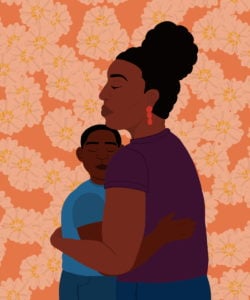This post was adapted from an edition of The Trace’s Philadelphia newsletter. Subscribe via this link or the widget below to get exclusive dispatches delivered straight to your inbox each month.
The Philadelphia Masjid is steps away from my old way, and it’s still home to family and old friends. So when I learned about the April 10 shooting at the West Philly park near the Masjid during an Eid al-Fitr celebration, I felt frozen. My loved ones could have been there.
Here are the facts. Roughly 1,000 people were at the Philadelphia Masjid’s Eid celebration when at least 30 bullets were fired. Three people were shot and one person was injured by a police officer. No one died. The shooting involved two rival groups of young people. Five were arrested; all but one were younger than 18.
But those cold numbers, the type news outlets often focus on in their coverage of shootings, don’t account for what this disturbance of peace — during an Islamic holiday affair marking the end of Ramadan, a month of dawn-to-sunset fasting — looked like on the ground that afternoon. Khimars and hijabs fell off women’s heads. People ducked and jumped behind trees, while others were trampled. Children cried as they were separated from their parents.
Two days after the shooting, the Philly Masjid held a press conference. I knew I had to be there, to find out not only how my neighbors were feeling, but also how they were coping.
As I arrived that day, I gazed between the park and the Masjid and reflected. Just after the shooting, nearly every local news station ran stories about it. Even some national news outlets covered it. In a city that regularly experiences high levels of homicide, there were no fatalities in this outbreak of violence. So would the follow-up coverage be as intense as the initial media response?
At the press conference, while dozens of us waited to hear from Philadelphia Masjid leaders, I met Antoinette Lewis, a friendly woman and a 25-year Masjid member who was at the park the day of the shooting.
“That’s how long I’ve been Muslim,” said Antoinette. “And that was my table on the news. The one that said Eid Mubarak.”
The shooting was particularly harrowing for her, because it brought up another moment of profound loss — that of her son, a victim of gun violence in Philadelphia, who died on August 27, 2018. She recalled that, during the Eid shooting, she hollered, “Why?”
“It brought back memories of losing my son,” she said, “and I just went down.”
Still, Lewis said that the violence at the celebration was not going to stop her from coming back to the Masjid.
“I’m not going to let nothing come between me and my deen,” she said, referring to her faith. “But I just want to know what would make you come to an Eid with a gun that you’re not old enough to carry.”
You are not alone
If you or someone you know has been affected by gun violence in Philadelphia, check out our Up the Block resource guide.
Then it was time for the religious leaders to speak.
“April 10th will always be remembered as a day of a miracle,” said Imam Saifullah Muhammad, business manager and spokesperson of secular affairs at the Philadelphia Masjid. “Nobody lost their mother, nobody lost their son.”
Masjid leaders also announced plans for an April 27 community event in response to the violence. The community event, Muhammad said, could be the “start of the healing process” so “people, especially our children, can feel comfortable coming back to that site.”
There are still questions about the shooting and its aftermath. According to Scoop News, Eid al-Fitr celebrations have been taking place in this West Philadelphia location for 50 years without issue, apart from one minor firecracker incident. Who are these young adults who decided to do something that, to my knowledge, has never been done in Philly before, and who do these children belong to? Will there be armed guards or police presence during large gatherings at this facility moving forward? What happens next?
“There should have been protection from the Philadelphia Police Department,” Monjurul Abedin, secretary at the Northeast Islamic Center, told me in a separate conversation. It could have been prevented. “If the police were there, the bad guys will see that we’re going to be in trouble.”
Abedin told me about the necessity of having protection at the Masjid. It wouldn’t be unprecedented; the Northeast Islamic Center uses private security. Abedin suggested that the Philadelphia Police Department start checking in with masjids on Fridays during Jummah. “If not every Friday, then every other Friday,” he said.
While walking back to my car from the press conference, I encountered a woman coming from the same direction at a stoplight. As we waited for it to turn green, I said hello. It took her a minute to realize that I had greeted her.
“Sorry,” she told me. “I couldn’t help but to keep looking back.” She pointed toward a tree in the park.
“That tree saved my life,” the woman said. “I saw the shooters. My granddaughter and I hid behind this tree and I prayed.”
I hugged her. We didn’t exchange names. But we gave each other love and parted ways.
While the trauma and disturbance of the April 10 mass shooting is still fresh, congregants who attended the April 27 event said people of all walks of life came together to begin the healing process — this time in the presence of armed guards and heightened security measures.


